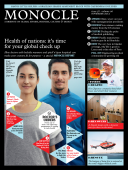
Issue 58
A special report on world health, a Danish hospital with a domestic twist, and don’t miss our Expo on a regular day at the office in Japan, which starts with bending and stretching exercises.
In This Issue
Oops! No content was found.
Looks like we no longer have content for the page you're on. Perhaps try a search?
Return Home

